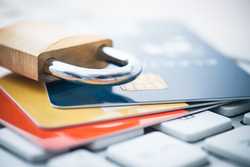How to Report (and Prevent) Credit Card Fraud

Our evaluations and opinions are not influenced by our advertising relationships, but we may earn a commission from our partners’ links. This content is created by TIME Stamped, under TIME’s direction and produced in accordance with TIME’s editorial guidelines and overseen by TIME’s editorial staff. Learn more about it.
Identity theft is one of those things that sounds scary, but you’re pretty sure it’ll never happen to you. Kind of like an Internal Revenue Service (IRS) audit. Wrong.
Credit card fraud is a type of identity theft, and it happens all the time. When someone uses your payment method without your consent, they’re effectively pretending to be you. If you detect it early and report it, you can avoid the most serious repercussions. Thanks to zero liability credit cards, you probably won’t have to pay for unauthorized charges. But if you wait too long, you could be caught—and there are other dangers you should know about.
Ensure your financial security and enroll with Identity Guard identity protection service - one of the industry leaders in protecting you from identity fraud.
If a scammer is able to procure your credit card details (your account number, CVV, and expiration date), they can spend your money with impunity. Think about it; merchants almost never ask for ID or compare signatures at checkout, and online stores seldom enforce two-factor verification.
Even worse, if a thief gets hold of your Social Security number, they can use it to open new credit cards in your name, then rack up huge balances for which you could be held responsible (if you don’t report them in a timely manner). If you’re someone who doesn’t pay much attention to your credit activity, you may not even notice that a new card has been opened, which could result in a delinquent account as you miss payments.
Credit card fraud can happen in a variety of ways. A scammer could:
The hoaxes aren’t as easy to avoid as you might think. Scammers are good at what they do. It’s worth understanding common fraud tactics, so you have the best chance of foiling them.
The most rudimentary form of credit card fraud is the physical theft of your card. For example:
Theft of your credit card doesn’t work very well, because you’ll likely realize rather quickly that it’s missing. A phone call to your card issuer will result in a useless piece of plastic in the hands of the criminal. Your card will be canceled, and you’ll receive a new, completely safe credit card shortly afterward.
Phishing is the act of trying to gain sensitive information by pretending to be a trustworthy company. It can take many forms, but it’s usually via email or text.
For example, you may receive an email that purports to be from your credit card issuer telling you that your password is about to expire. The email has a link that directs you to the bank website’s landing page for changing log-in credentials, but that page is bogus. It’s a malicious page that looks extremely similar to the real thing. Once you enter your user ID and password, the scammer has your information.
You may also sign onto a free public Wi-Fi hotspot that is actually managed by a thief. Joining that network can allow your every move to be monitored. If you sign into any of your financial accounts while using the network, the thief can learn your passwords and other sensitive information.
Credit card cloning is when a criminal copies your credit card data and transfers it to a blank credit card. This allows them to use your card as their own, even for in-store shopping.
Cloning is done primarily with devices known as “skimmers,” which are attachments placed on credit card terminals to read your card when you make a payment. They’re often found on point-of-sale devices that aren’t manned by an attendant, such as a gas pump or an ATM.
Skimmers can be plugged into magnetic stripe readers, or they can be false keypads that sit atop the original keypad. They convincingly mimic the real credit card terminal; you won’t notice unless you’re on the lookout.
Phone scams continue to be a booming industry. A scammer will attempt to acquire your credit card details by purporting to represent a charity or be a debt relief specialist. They may also pose as an employee of a government agency, such as the IRS or the Social Security Administration, offering increased benefits or threatening you with arrest if you don’t pay fictitious fines immediately.
Once you realize you’ve been defrauded, your first step should be to contact your credit card’s issuing bank and notify it. The number on the back of your card will help you to reach the fraud department quickly. If your card has been stolen, a quick Google search for the customer service hotline should return the same number. The bank will investigate the fraud, cancel your card, and send you a new one.
Next, you’ll want to report the stolen card to both the authorities and the credit bureaus.
IdentityTheft.gov is the place to file a report about your stolen credit card. Arguably more important for your personal finances, though, is to notify the three major credit bureaus: Equifax, Experian, and TransUnion. They’ll aid in fixing any incorrect information due to fraud, which will protect your credit from things such as:
The three major credit bureaus allow you to create a fraud alert on your credit report. This makes it more difficult for a thief to use your credit for their own gain, as it prompts lenders to verify that you’re the one applying for the loan. Fraud alerts can be created and canceled as often as you like, though they usually last one year.
The best way to avoid fraud is to be skeptical of everything. Never give out your details over the phone. Never make purchases on sketchy websites. Never use public Wi-Fi to access sensitive files. If that’s not possible, pay for your own virtual private network (VPN); it will keep your connection secure even on a public network.
When you’re out and about and using your credit card, rattle point-of-sale devices to ensure that there’s no skimmer attached. You’ll often be able to pull off false scanners and keypads. It might feel unnecessary, but it can pay off in a big way.
Combing through your account transactions should be a monthly activity, even if you’re not concerned about fraud. It’s wise to take a look at your monthly statement to catch:
Additionally, you should regularly examine your credit report to confirm that all information is current and correct. AnnualCreditReport.com offers a free copy of your report once per year. If something doesn’t look right, reach out to the credit bureau. It will help you investigate the problem.
When you enroll in credit monitoring, you’ll be notified any time there’s a credit check, immediately alerting you to someone trying to use your credit. You can also set up alerts directly with your card issuer that can notify you about any international transactions or charges above a specific dollar amount.
To further ensure your financial security, you can enroll in an identity protection service. Identity Guard is one of the industry leaders in protecting you from identity fraud. It comes with features such as:
This is an easy code to live by: Never share your credit card information with someone who contacts you. It doesn’t matter who the individual on the other end of the phone, email, or text message claims to be. If you didn’t initiate the conversation, assume the person you’re talking to is up to no good.
If you’re called by a charity, bank, debt collector, or anyone you believe to be legitimate, hang up, Google the establishment’s number, then call that number to proceed with your payment.
Refuse to let yourself become complacent when it comes to credit cards. Examine every credit card terminal, be leery of every phone call that solicits money, and pore over your account activity with regularity.
At the first sign of suspicious activity, report it to your credit card issuer and consider setting up notifications on your accounts that will alert you to items such as high balances, large transactions, and hard credit pulls.
Credit card fraud is the single most common form of identity theft, according to 2022 data from the Federal Trade Commission. It accounts for many millions of dollars lost by credit card holders every year.
A bank has 30 days from the time you report credit card fraud to begin its investigation. For example, if you notice a transaction you don’t recognize while perusing your credit card’s online account, you’ll often find a convenient option to dispute the charge immmediately. The bank will be notified, and it will let you know if you need to send any further documentation. Then, the bank will have 90 days to conduct its investigation.
If someone is trying to use your information to open a credit card, you should immediately contact the card issuer’s fraud department and explain the situation. You’ll then want to dispute the fraudulent accounts with the three major credit bureaus. You may even want to temporarily freeze your credit to ensure that no other loans are taken out in your name.
Until you’re confident that the problem has been resolved, you would also do well to opt into account alerts with the credit bureaus. This will require lenders to double-check with you before any new accounts are opened.
The information presented here is created by TIME Stamped and overseen by TIME editorial staff. To learn more, see our About Us page.



